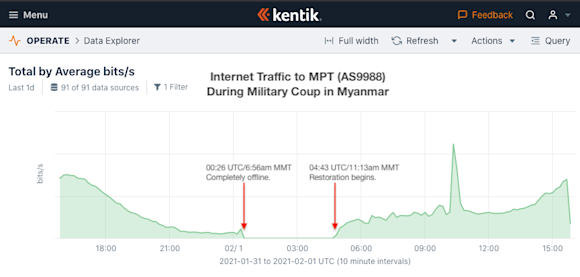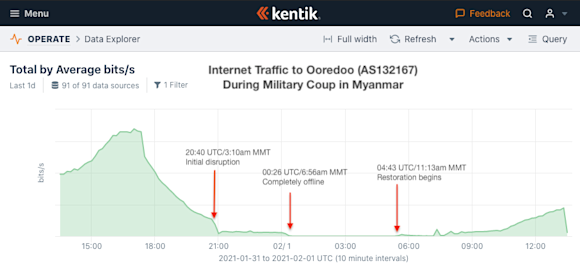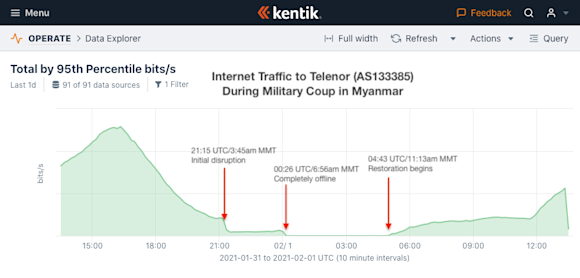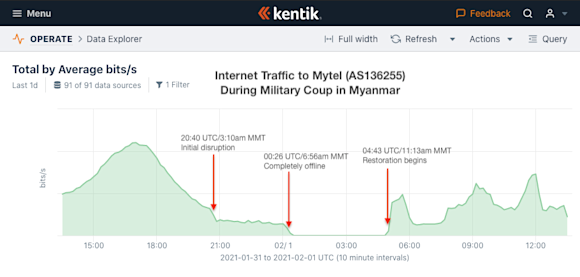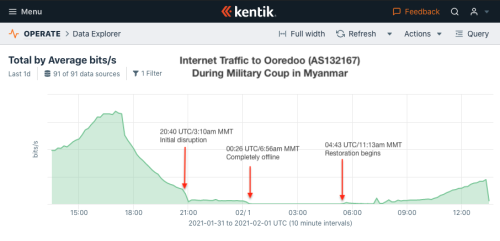
Summary
In the past 24hrs, Myanmar experienced a military coup d’état during which prominent government figures like Nobel laureate Aung San Suu Kyi were detained and internet service was almost entirely blacked out.
Here is what the shutdown looked like in our data (with annotations for timing) for Myanmar’s big four: Myanma Posts and Telecommunications (MPT), Telenor Myanmar, Ooredoo Myanmar, and Mytel.
In the past 24hrs, Myanmar experienced a military coup d’état during which prominent government figures like Nobel laureate Aung San Suu Kyi were detained and internet service was almost entirely disabled. It was a shocking turn to a once-promising story of a country’s journey from pariah state to accepted member of the international community.
Myanmar (also called Burma) is no stranger to internet shutdowns. Prior to the infamous Egyptian internet shutdown a decade ago, Myanmar’s shutdown of 2007 (detailed here) was perhaps the most notable instance of a government using a large-scale communications blackout as an act of political repression.
However, in 2011, the government of Myanmar implemented political reforms that sought to restore democracy and relations with the international community. A liberalization of the telecom sector followed and Myanmar held an open international auction for telecom licenses which resulted in two new mobile operators: Telenor of Norway and Ooredoo of Qatar. Later, a third mobile operator won a concession to operate in Myanmar: Mytel, backed by Vietnamese-military owned Viettel. The new mobile operators helped build an extensive telecom infrastructure resulting in a transformative internet boom for the country.
Around this time I would often use Myanmar as a model that Cuba could follow to rapidly liberalize their internet and telecom industry. In 2014, I was interviewed on NPR where I made that case, and then, with a nod to the Cuban government’s origins, I wrote,
there is reason to believe that the impressive growth being experienced currently in Myanmar could be replicated in Cuba — but it would require a capitalist approach for one of the world’s last remaining communist countries. In Cuba, such a mind shift would be … revolutionary.
Last week, Peter Micek of Access Now and I wrote in a blog post marking the tenth anniversary of the shutdown in Egypt,
With ten years of hindsight, we can see that the Egyptian internet shutdown was not an anomaly, but rather a harbinger of things to come, namely, an era where internet communications would be directly threatened by repressive governments in an effort to control their own people.
Today’s incident in Myanmar joins internet shutdowns in Uganda and Cuba just this month. When taken together, these episodes further underscore that the battle against internet shutdowns is far from over.
Here is what the shutdown looked like in our data (with annotations for timing) for Myanmar’s big four: Myanma Posts and Telecommunications (MPT), Telenor Myanmar, Ooredoo Myanmar, and Mytel. Some providers in Myanmar managed to stay online during the blackout, such as 5BB Broadband (AS133384) and Myanmar Broadband Telecom (MBT, AS135300).
